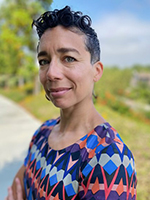Participants: |
|

|
Tameka Clemons Tameka A. Clemons, Ph.D. is a Clinical Associate Professor of Biochemistry in the Department of Biomedical Sciences at the Tillman J. Fertitta Family College of Medicine at University of Houston. Dr. Clemons received her Ph.D. in Biochemistry from Meharry Medical College in Nashville, TN and her B.S. in Chemistry from Xavier University in New Orleans, LA. She has received several NIH-funded fellowships such as PRIDE, Diversifying CNS, LEADS, and BRAINS fellowships, as well as an IRACDA postdoctoral fellowship at Emory University. Dr. Clemons research focuses on identifying more normal functions of amylin, as well as understanding the role of amylin in Alzheimer's disease, Type II diabetes, and Obesity. |

|
Tanisha Hill-Jarett Tanisha Hill-Jarrett, PhD is a neuropsychologist and an Assistant Professor in the Department of Neurosurgery and Brain Repair at the University of South Florida. Her broad research interests include cognitive aging and has largely centered on understanding (1) racial/ethnic disparities in cognitive aging and (2) the effects of psychosocial contributors (e.g., education, environmental stressors) on the cognitive functioning and cognitive trajectory of Black older adults. Her current grant funding examines the relationship between racism/gendered racism across the lifetime, psychological coping style, and the cognitive functioning of Black older adults. |

|
Mariajose Metcalfe Dr. Metcalfe received her undergraduate degree from the Pontificia Universidad Catolica de Chile in 2004, and her Ph.D. from The Graduate Center of the City University of New York in 2012. She completed her postdoctoral training at Burke Neurological Institute where she studied axonal degeneration in the context of spinal cord injury (SCI). In 2015, Dr. Metcalfe joined the University of California, Irvine, as Laboratory Director, where she focused on studying a therapeutic approach to enable regeneration to reverse paralysis by manipulating genes in the cortical neurons that give rise to the corticospinal tract (CST), one of the tracts that is interrupted after a SCI. In 2019, Dr. Metcalfe became a Project Scientist, with her studies centered on the development of combinatorial strategies to promote axonal growth using viral vector approaches. Building on recent advances in AAV biology, Dr. Metcalfe has developed a new and very powerful platform for SCI regeneration, based on the development of "rAAV-retro" that are robustly transported in a retrograde fashion. Dr. Metcalfe has engineered a retrograde AAV that carries the shRNA against PTEN (rAAV-retro/shPTEN) and single injections of rAAV-retro-shPTEN/GFP into the cervical spinal cord of rats, thereby eliciting PTEN knock-down in the motor cortex. The use of this technology addresses interventions to study neuron-intrinsic growth regulators; however, regeneration is still impeded by the growth-hostile environment of the damaged spinal cord. One way to address this impediment is to digest the scar tissue formed by chondroitin sulfate proteoglycans (CSPGs) produced by reactive astrocytes. Because scar tissue acts as a stop signal for growing axons, digesting CSPGs with the enzyme chondroitinase ABC (ChABC) will enable neuronal extension and axonal regeneration. Consequently, Dr. Metcalfe designed an AAV-ChABC, that effectively digests CSPGs in the spinal cord. Further advancing and building on her work, Dr. Metcalfe’s lab is testing whether a twin vector system, with one vector of the pair expressing shPTEN that will target intrinsic factors promoting regeneration of cut axons, and the second vector expressing ChABC, thereby targeting CSPGs that contribute to the growth-hostile environment present after SCI, will promote sprouting of spared axons after a SCI. Current and future projects reflects her long-standing interest to contribute to our understanding of the biology of regeneration. |

|
Rowena Ng Dr. Rowena Ng is a pediatric neuropsychologist at Kennedy Krieger Institute and an assistant professor at the Department of Psychiatry and Behavioral Sciences at Johns Hopkins University School of Medicine (JHUSOM). She received her doctorate from the University of Minnesota Institute of Child Development in Child Clinical Psychology. Dr. Ng completed a clinical psychology internship at the University of California Los Angeles David Geffen School of Medicine and a pediatric neuropsychology fellowship at the University of Michigan –VA Ann Arbor Consortium. In addition to these training experiences, she was previously highly involved in multisite neurobehavioral phenotyping investigations at the Salk Institute of Biological Studies and UCSD School of Medicine. Dr. Ng’s research to date has focused on developing experimental designs to collect imaging data, behavioral data, and psychophysiological assays to best capture the social and cognitive phenotype of Williams syndrome (WS), partial WS, and idiopathic autism spectrum disorder. Her work at the University of Minnesota and University of Michigan also expanded to applying interdisciplinary methods to study risk factors of youth with psychopathology and children with developmental disorders using a combination of imaging biomarkers, neuropsychological diagnostic tools, and qualitative data coding/analysis. Currently, she is interested at behavioral disease phenotyping rare conditions - specifically epigenetic syndromes with disruptions in the regulatory pathways for gene expression. Her investigations involve integrating standardized neuropsychological tests with laboratory-based behavioral paradigms and electrophysiological measures to determine syndrome-specific neurobehavioral profiles and biomarkers, which may be utilized in assessing efficacy of clinical trials. |